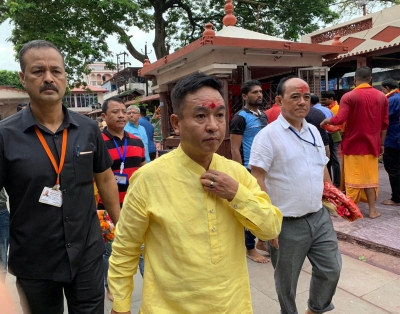
Guwahati: Sikkim Chief Minister Prem Singh Tamang extended warm greetings on Wednesday to the people of the state, especially the Buddhist community, on the occasion of Saga Dawa, one of the holiest festivals in the Buddhist calendar.
In a message marking the spiritually significant day, which commemorates the enlightenment and Mahaparinirvana (passing) of Lord Buddha, CM Tamang reflected on the enduring relevance of the Buddha’s teachings.
“Saga Dawa serves as a powerful reminder of Lord Buddha’s timeless teachings of non-violence, compassion, brotherhood, and harmony that continue to inspire humanity,” he said.
Underscoring the contemporary importance of these values, the chief minister urged citizens to embrace peace and empathy in their daily lives.
“May the radiance of his wisdom dispel the shadows of hatred and intolerance, ushering in an era of peace, contentment, and spiritual awakening,” he added, highlighting the deeper spiritual message of the occasion.
Tamang also used the moment to call for greater social unity. He appealed to the people of Sikkim to rise above barriers of caste, creed, gender, and religion, and to recommit themselves to the principles of Dharma, truth, and righteousness.
His message emphasised the need to foster unity in diversity, resonating with the core values of the Buddhist philosophy being celebrated during Saga Dawa.
Saga Dawa is being observed with deep reverence across the Himalayan belt and other Buddhist regions. Celebrated on the full moon day of the fourth month in the Tibetan lunar calendar — typically falling in May or June — the festival commemorates the birth, enlightenment, and passing of Lord Buddha Shakyamuni.
These three pivotal moments in the Buddha’s life are considered the foundation of the Buddhist path.
Known as the “month of merits,” Saga Dawa inspires practitioners to deepen their spiritual discipline through acts of compassion, generosity, and mindfulness.
Monasteries and temples are thronged by devotees offering butter lamps, alms, and incense, while chants of sacred mantras fill the air.
Many observe the eight Mahayana precepts for a day, refraining from negative actions and focussing on cultivating inner virtues. The belief is that any good deed performed during this time is multiplied manifold, thus drawing Buddhists to engage in more virtuous conduct throughout the month.
The festival is marked by unique traditions across regions. In Tibet, a spectacular ritual includes the ceremonial replacement of a massive prayer flag pole at Mount Kailash, considered one of the holiest sites in Buddhism.
Processions with monks carrying sacred texts through the streets, alongside public prayers and offerings, lend a festive yet solemn tone to the occasion. It is a time not just for rituals, but of collective reflection and renewal of one’s spiritual commitments.
